Trace Elements
All information about "Trace Elements" and the related magazine articles can be found here.
Our articles are written clearly and link to scientific studies where relevant. This is how we meet our own standards: we regularly deliver new, high-quality content for you—free of charge, no sign-up required, with the highest possible benefit to you.

Your rest compass for the summer: Naturally in balance with saffron.
Gentle support from nature for mental serenity and your well-being
Does your inner rhythm sometimes falter in the hustle and bustle of everyday life and does your serenity wane? With saffron, nature offers a valued way to harmonize the carousel of thoughts and cultivate your inner center. Discover here how the red gold can lead you back to new balance and lightness.

Inner peace for hot days, with GABA and rose root extract
Support your nervous system with herbal active ingredients that can reduce stress, stabilize your mood and promote your mental balance even in the summer heat.
Summertime often brings stress due to heat, travel or busy schedules. GABA and the adaptogenic rose root extract help you to get through the summer more calmly by promoting your stress resistance and inner peace. So you can enjoy your emotional balance and greater well-being.

Light legs, light day. How horse chestnut, vitamin C and OPC help against heaviness
Discover how proven plant extracts and vitamins can relieve the feeling of heavy legs. For more lightness in everyday life for mom, grandma & co.
Heavy legs after a long day? Horse chestnut, vitamin C and OPC can promote blood circulation, strengthen the veins and noticeably relieve the feeling of tired, weighed-down legs. Ideal for anyone who stands a lot, walks a lot or simply wants to stay active in everyday life. Whether mom is out shopping or grandma is out for a walk. Find out how these natural active ingredients support your leg health and give you new lightness.

Mental strength in summer?
Ashwagandha and roseroot help you stay calm and alert on hot days
Summer brings light, energy and sometimes a lot of stress. So it's a good thing that nature has two herbal allies in the form of ashwagandha and roseroot, which can promote mental balance and resilience. Find out more!

Rescue for cozy summer evenings
Natural mosquito repellent with vitamin B1 & essential oils
Whether it's a garden party or an evening stroll: as soon as it starts buzzing, the mood is gone. Vitamin B1 and essential oils such as citronella or lavender can help to gently keep mosquitoes away. How does this work? Read here how natural remedies ensure carefree summer evenings.

Summer, sun, full concentration!
How phosphatidylserine and omega-3 can boost your concentration
The sun is shining but your concentration is waning? Discover how phosphatidylserine and omega-3 fatty acids can naturally boost your mental performance.

Relaxed baby bump: Natural support with inositol, folic acid, cranberry & D-mannose
Balance and well-being for women who want to have children or during pregnancy
Wanting to have children or already pregnant? A lot changes during this special phase. Smart nutrients such as inositol, folic acid, cranberry and D-mannose can provide targeted support: They promote hormonal balance, strengthen the urinary tract and bring more balance to everyday life. Find out now how you can do something good for yourself naturally.

Start your vacation full of energy with potassium & magnesium citrate
How to keep you and your family fit, active and balanced even in the heat
On summer vacation, electrolytes such as potassium and magnesium quickly become unbalanced. This can affect energy, muscles and concentration. Find out here how you can strengthen your inner balance with smart nutrition and targeted supplements.
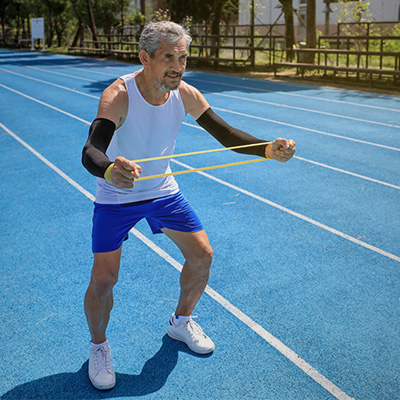
Strong heart, strong life. Promoting men's health naturally
Gain new energy and vitality with coenzyme Q10, chokeberry as a medicinal plant and targeted care for the cardiovascular system.
The heart is the engine of your life - and men in particular should pay special attention to it. Find out how you can use the effects of coenzyme Q10, the healing power of the aronia berry and a healthy lifestyle to strengthen the function of your cardiovascular system and support your overall health as a man.

When the hormone balance changes
Gentle nutritional support through the menopause
The menopause changes many things - both physically and emotionally. Myo-inositol, vitamin D3 and magnesium can help to boost your well-being, support your metabolism and activate new sources of energy. Find out more here!

Comfort food for super moms
Choline, lecithin & vitamin B12 - powerful micronutrients for a strong pregnancy
Did you know that certain nutrients can have a positive effect not only on your well-being, but also on your baby's development? Choline, lecithin and vitamin B12 are little helpers with a big effect - for strong nerves, clear thoughts and a good gut feeling during this special time.

Playground power for every day
Calcium & vitamin K2: For bone health that grows with you
Whether romping around with the children or the daily balancing act between job and family - strong bones are the stable foundation. Find out how calcium and vitamin K2 can playfully help to strengthen your bones.

Naturally powerful: Turmeric, boswellia & ginger
Learn how to gain more zest for life with plant power
Plant-based active ingredients can help to reduce inflammation and make everyday life more active and mobile - whether in the garden, during sport or on a family outing.
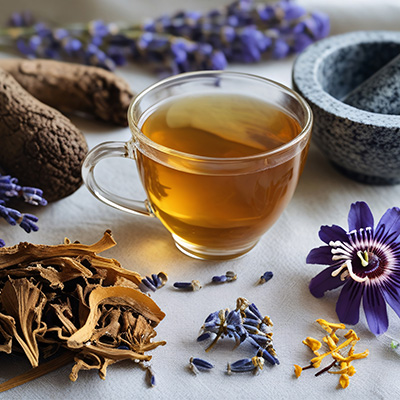
Finally sleep well again - even in summer!
Discover natural sleep aids with melatonin, passion flower & co.
Is the summer light depriving you of sleep? We show you how you can support your sleep-wake rhythm with natural remedies such as melatonin and passionflower.

Sun protection from within - with the power of vitamin A, astaxanthin and omega-3
Strengthen your skin with natural nutrients that reduce oxidative stress, soothe inflammation and prevent premature ageing.
The first rays of sunshine are here - but your skin is particularly sensitive after the winter. Discover how vitamin A, the antioxidant astaxanthin and essential omega-3 fatty acids can protect your skin from the inside out and optimally prepare it for UV radiation. For a radiantly healthy complexion and effective anti-ageing support.

Spring cleaning for the body!
Drain naturally - with nettle, dandelion & potassium
Find out more about dandelion, stinging nettle and potassium to gently drain your body and get back on track with ease!

Naturally against allergies - Black cumin oil and quercetin in use for your well-being
Gentle support from nature for hay fever, pollen allergies and allergic reactions
Itchy eyes, sneezing attacks and constant pollen stress? Black cumin oil and quercetin offer natural help for allergic symptoms. Find out how the two herbal active ingredients work, when it is the right time to use them and what you should look out for when choosing them.

Strong through the pollen season with omega-3 and vitamin E
How to strengthen your child's airways
When pollen irritates the airways, it can quickly become unpleasant for children. Find out why omega-3 and vitamin E can not only support but also prevent and how you can easily incorporate the two substances into your everyday life!
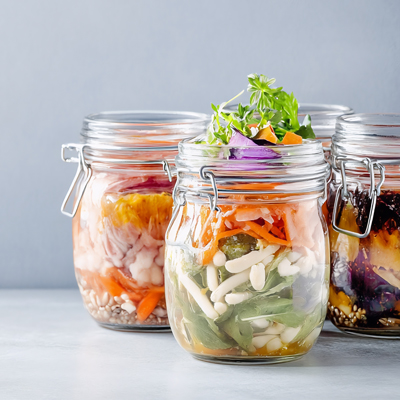
Fit for spring: Stimulate metabolism with inulin, probiotic foods & intestinal cure
Intestinal cleansing for better digestion, the natural effects of inulin and the benefits of probiotic foods for your metabolism
Get a vital start to spring and bring your body into balance - with targeted nutrition that boosts your metabolism, supports digestion and rebalances your gut with the help of a gut cleanse, inulin and probiotic foods. Find out how to boost your gut health and gain new energy - from the inside out!
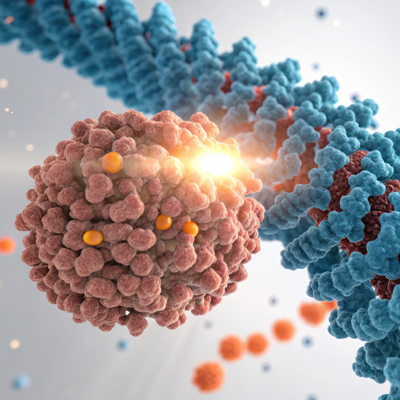
New cell energy with B vitamins, NADH and alpha lipoic acid
NADH, alpha lipoic acid and B vitamins play a central role in human metabolism for energy, concentration and cell protection.
Discover how these nutrients support the body against exhaustion, oxidative stress and loss of performance - for more vitality and mental strength in everyday life!

Sleep better with lemon balm, passionflower and L-theanine
These natural helpers bring peace to your evening
Sleep disorders? Stress in the evening? Herbal helpers such as lemon balm, L-theanine and passionflower can gently support the sleep-wake rhythm and help you to finally calm down. Read the article now to find out how you can harness the power of nature for restful nights.

Spring fever for the soul
Naturally more balance with 5-HTP, L-tryptophan and vitamin B6
The sun is shining - but everything still feels heavy inside?
These three mood boosters gently help you arrive in spring: for more rest, sleep and stability. Find out more here!
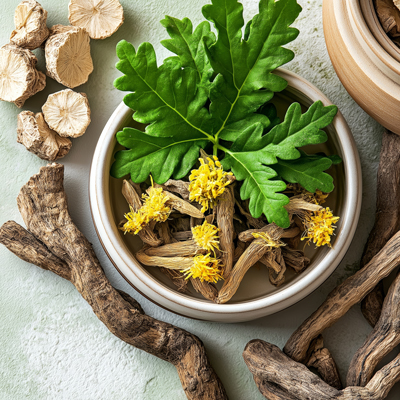
Building inner strength - more relaxed through spring
Plant adaptogens for more balance, energy and mental freshness
Spring is the perfect time to recharge your batteries and do something good for yourself. Rhodiola and cordyceps provide natural and effective support. Find out more here!

Strengthen your immune system with rockrose, zinc and vitamin C
Natural support for your immune system
Cistus, zinc and vitamin C can provide your body with valuable support in moody weather. Find out how these three building blocks gently strengthen your defenses and give you more well-being in everyday life.
Trace elements: small amounts, big impact on health
Sometimes it's the little things in life that make the biggest difference – and that also applies to health. Trace elements are perfect examples of these small but crucial components. Although the body only needs them in the smallest of quantities, they are essential for our well-being. These tiny minerals ensure that the body functions well all round, whether it's coping with a stressful day at work, achieving personal fitness goals or simply getting a daily boost of energy. We have all the important information!
What are trace elements?
Most people have heard of them, but what exactly are these trace elements? Trace elements are essential minerals, i.e. chemical elements that the human body needs only in tiny amounts – often only a few milligrams or even micrograms per day – but which play a crucial role in health every day [2]. Despite their low concentration in the body, they are involved in quite a few vital functions.
Important: The body cannot produce them itself, which is why they have to be obtained from food.
They support the work of numerous enzymes in important chemical reactions, promote hormone production, contribute to cell regeneration and are also essential for the formation of bones and tissue [4]. So if that's not important for our body! Although essential trace elements are only present in trace amounts, they have an enormous effect on the proper functioning of the body and are indispensable for our well-being.
What is the difference between trace elements and bulk elements?
Bulk elements are minerals such as calcium or magnesium. The main difference between trace elements and bulk elements lies not only in the quantity required, but also in their role and distribution in the body:
Bulk minerals are needed in larger quantities (milligrams to grams) and are often stored in bones, teeth and body fluids. They play a central role in maintaining structure and function, such as the stability of bones or the regulation of heart rhythm [3].
In contrast, trace elements are only needed in very small amounts (micrograms to milligrams) and are often involved in enzymatic processes or as cofactors in various biochemical reactions. They are often present in the body in very small concentrations, but their functions are equally crucial. Trace elements support specific biological processes such as oxygen transport or cell regeneration [3].
What are the most important trace elements and what are they for?
In small quantities, but with an enormous effect, trace elements are essential for the proper functioning of the body. The following five essential trace elements (there are 14 in total) are indispensable for the human body because they fulfill important tasks:
Iron
Iron is essential for the transport of oxygen in the blood. It is a major constituent of hemoglobin, the protein in red blood cells that carries oxygen from the lungs to the cells. Iron deficiency can lead to iron-deficiency anemia, a condition characterized by fatigue, weakness, and pallor [6,14].
Zinc
Zinc plays a key role in the immune system and is involved in over 300 enzymatic reactions. It aids wound healing, which is why it is used in many wound creams. It also promotes growth and cell division and helps the body to defend itself against infections. In addition, zinc is important for the metabolism of carbohydrates, proteins and fats [7].
Selenium
Selenium is a powerful antioxidant that protects cells from damage by free radicals – unstable molecules that can attack other cell structures due to their reactivity and are formed by environmental pollution, UV radiation or stress. Selenium is also important for thyroid function and helps regulate the metabolism. In addition, selenium-containing enzymes support the immune system and have anti-inflammatory properties [8]. A real all-rounder!
Copper
Copper is essential for the formation of connective tissue, the production of melanin and energy metabolism. It also plays an important role in the functioning of the nervous system and supports the immune system. A copper deficiency can have long-term consequences and lead to anemia, bone abnormalities and neurological problems [9].
Iodine
Iodine is necessary for the production of thyroid hormones, which regulate metabolism. These hormones influence many physiological processes, including growth, energy production and protein synthesis. An iodine deficiency can lead to hypothyroidism, which can manifest itself in fatigue, weight gain and sensitivity to cold. Adequate iodine intake is particularly important in nutrition during pregnancy to ensure the healthy development of the fetus and avoid complications [13].
Other essential trace elements include manganese, chromium, molybdenum, fluoride, cobalt, nickel, silicon, vanadium and tin.
Minerals: What is the recommended daily dose?
The daily requirement of trace elements varies depending on age, gender and state of health. Here are the current recommendations of the DGE [1]:
- Iron: adults: 10-15 mg, pregnant women: 30 mg, breastfeeding women: 20 mg
- Zinc: adults: 7-10 mg, pregnant women: 7-10 mg (depending on the phytate content of the diet), breastfeeding women: 11 mg
- Selenium: adults: 60-70 µg, pregnant women: 60-75 µg
- Iodine: adults: 200 µg, pregnant women: 230 µg, breastfeeding women: 260 µg
- Copper: adults: 1-1.5 mg
- Manganese: adults: 2-5 mg
These amounts serve as a general guideline. Individual needs may vary depending on your diet and state of health.
Which foods are rich in important trace elements?
The following list shows which foods are rich in important trace elements and how you can cover your daily needs in a natural way.
- Red meat, offal such as liver (iron, selenium, copper, zinc)
- Fish, seafood, oysters (iron, zinc, iodine, selenium)
- Seaweed (iodine, iron, zinc)
- Pulses (iron, zinc, copper)
- Wholegrain products (iron, zinc, selenium, copper)
- Green leafy vegetables (spinach) (iron)
- nuts, seeds (iron, zinc, copper, manganese)
- Brazil nuts (selenium, in moderation)
- iodized salt (iodine)
- milk products (iodine, zinc)
- eggs (selenium, zinc, iron)
A balanced diet with a variety of plant-based and animal-based foods can usually cover the need for all essential trace elements. Whole grain products, nuts, seeds, legumes and green vegetables are particularly valuable sources of various trace elements. Foods rich in vitamin C, such as bell peppers, citrus fruits or berries, can also help the body absorb iron from plant-based foods. Whether you are vegan, vegetarian or eat meat, there are many ways to supply the body with the nutrients it needs.
What influence do trace elements have on the immune system?
Important trace elements such as zinc and selenium play a key role in supporting the immune system. They promote the production of white blood cells and help the body fight off infections [10]. They also have an antioxidant effect and protect cells from oxidative stress caused by free radicals.
Studies show that an adequate intake of trace elements can reduce the risk of chronic diseases. For example, selenium deficiency is associated with an increased risk of cardiovascular disease [12]. Research also suggests that zinc can shorten the duration and severity of colds [7].
Vitamins: the power partners of trace elements
Vitamins and trace elements are real team players when it comes to health. Here are the most important partnerships:
- Vitamin A needs zinc, iron and other substances for transportation and to develop its active form [5]
- Vitamin B1 works closely with magnesium to keep the carbohydrate metabolism going
- Vitamin B2 supports iron absorption together with zinc
- Vitamin B6 needs magnesium for reinforcement
- Vitamin B12 uses folic acid and cobalt to get involved in blood formation [3]
- Vitamin C ensures that iron from plant sources is better absorbed and supports zinc in strengthening the immune system [3]
- Vitamin D is a real bone friend and, in combination with calcium, ensures strong bones. Magnesium helps convert vitamin D into its active form [3]
- Vitamin E and selenium are a dynamic duo that acts as an antioxidant to protect cells from damage [3]
And don't forget: Vitamin K works together with calcium to keep bones strong and is supported by magnesium to promote bone health [3]. But what to do in case of vitamin deficiency? Here you will find valuable information!
Dietary supplements: when are they useful?
Dietary supplements can be useful as an addition to a healthy diet if the diet alone does not cover the need for trace elements, e.g. in certain diets, vegetarian or vegan diets or in special phases of life such as pregnancy and breastfeeding.
During pregnancy, an adequate intake of iodine, iron and folic acid is essential [13]. Folic acid should be taken in the form of capsules to support cell division and fetal growth and to reduce the risk of neural tube defects in the unborn child [13].
Important: Supplementation should always be done in consultation with a doctor to avoid possible risks from overdosing.
What are the symptoms of a deficiency?
A deficiency of trace elements can manifest itself in a variety of ways. Typical signs of iron deficiency are fatigue, pale skin and concentration problems. An iodine deficiency can lead to an enlarged thyroid gland (goiter), while zinc deficiency is often characterized by a weakened immune system and delayed wound healing. Find out more about the signs of zinc deficiency here!
Risk groups
Certain groups of people are at increased risk of a trace element deficiency. These include pregnant and breastfeeding women, the elderly, and people with chronic illnesses or special diets. Iron is a particular issue here, because iron deficiency is considered the most common deficiency disease worldwide [11]. Vegetarians and vegans should pay particular attention to their iron and zinc intake, as plant-based foods contain less bioavailable iron than animal-based foods..
Preventive measures
A balanced diet is the best way to prevent a deficiency of trace elements. The German Nutrition Society (DGE) recommends covering your daily nutrient intake with a varied diet that is rich in natural sources of trace elements [1]. For at-risk groups, targeted supplementation with food supplements can be useful, but this should be done in consultation with a doctor. Regular blood tests can help to detect a deficiency at an early stage and to take targeted action against it.
Sources
[1] https://www.dge.de/wissenschaft/referenzwerte/
[2] https://flexikon.doccheck.com/de/Spurenelement
[3] https://www.oege.at/wissenschaft/nahrungsinhaltstoffe-vitamine-mineralstoffe/
[4] https://www.who.int/health-topics/micronutrients
[5] https://www.ncbi.nlm.nih.gov/books/NBK234920/
[6] https://www.who.int/health-topics/anaemia
[7] https://ods.od.nih.gov/factsheets/Zinc-HealthProfessional/
[8] https://ods.od.nih.gov/factsheets/Selenium-HealthProfessional/
[9] https://ods.od.nih.gov/factsheets/Copper-HealthProfessional/
[10] https://www.ncbi.nlm.nih.gov/pmc/articles/PMC7019735/
[11] https://www.kbv.de/media/sp/KBV_LaborDiagnostik_Eisenmangel.pdf
[12] https://www.cochranelibrary.com/cdsr/doi/10.1002/14651858.CD009671.pub2/full/de
[13] https://mobil.bfr.bund.de/cm/350/jod-folat-folsaeure-und-schwangerschaft.pdf
